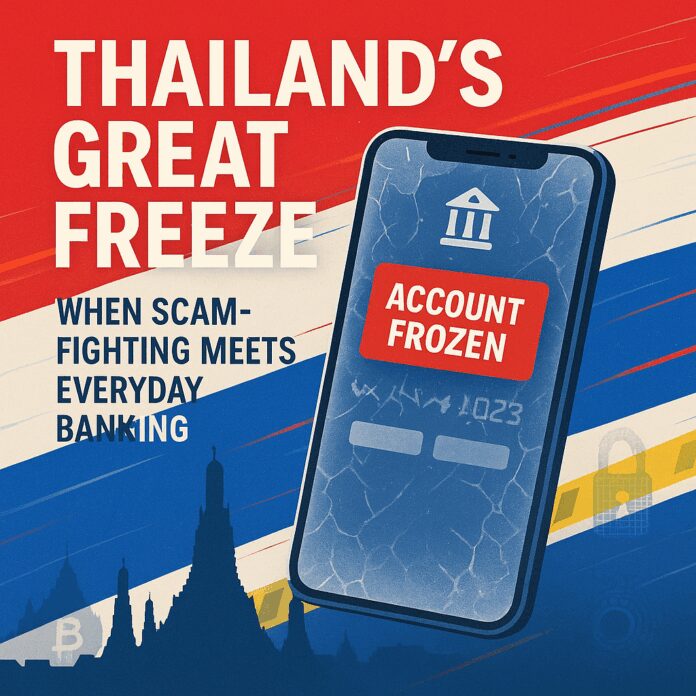Over the weekend, Thailand’s anti-scam blitz jumped from policy to people’s wallets: millions of bank accounts were reportedly frozen as authorities hunted “mule” accounts used by fraud syndicates, leaving SMEs and households unable to move money. (Cointelegraph; Bangkok Post; Thai Enquirer)
What just happened?
Thailand has been tightening digital-fraud rules for months. In late summer, regulators told banks to cap daily online transfers for many users by default (often 50,000 baht) with higher tiers unlocked via stronger KYC—aimed at slowing scammers and buying investigators time to claw funds back. (AP) Weekend reports say banks also froze suspected mule accounts at scale, and the digital dragnet appears to have caught some innocent users too—prompting a flood of complaints and a public call for calm. (Cointelegraph; Bangkok Post)
How big is “big”?
Figures circulating in tech and crypto circles put the impact as high as ~3 million accounts. That number is still being clarified; local media warn that more freezes may follow as investigations expand. Treat it as an upper-bound estimate until officials publish consolidated data. (Cointelegraph; Thai Examiner; Bangkok Post)
The regional context
Southeast Asia has battled industrial-scale scam networks since 2023–2025, from Myanmar and Cambodia border compounds to cross-border call centers. Thailand and China even set up a coordination center to dismantle syndicates, part of a wider crackdown that’s rescued thousands from coercive scam sites. (Reuters; The Guardian)
Cue the Bitcoin debate
When fiat rails freeze, crypto Twitter inevitably asks whether self-custody is the safer backup. Advocates point to this week’s chaos; skeptics counter that self-custody won’t protect you from volatility or phishing. Reality check: if your livelihood depends on uninterrupted payments, you need redundancy, not maximalism. Keep bank access, but know how to move a small emergency float you can securely self-custody. (Cointelegraph)
If you’re in Thailand right now, practical steps
- Check your tier & raise limits: Ask your bank how to move from default caps to higher ceilings via stronger KYC, per the new transfer-cap framework. (AP)
- Have a paper trail ready: Invoices, proof of income, and counterparties speed reviews if you’re flagged. Authorities say they’re working to streamline processes after backlash. (Bangkok Post)
- Diversify rails: Spread working capital across multiple banks and consider a small, well-secured crypto contingency—only what you can safely self-custody and actually operate. (Cointelegraph)
- Know the red flags: Rapid pass-through payments, big unexpected inbound transfers, and frequent third-party deposits can resemble mule behavior and trigger scrutiny. (Thai Enquirer)
Bottom line
Thailand’s trying to starve scammers of oxygen by slowing money and freezing suspect channels fast. Good goal—messy roll-out. Expect policy tweaks as regulators rebalance fraud-fighting with everyday usability. For everyone else, the evergreen lesson stands: build a Plan B before you need i




